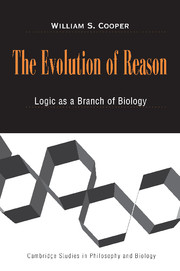Book contents
- Frontmatter
- Contents
- Foreword
- 1 The Biology of Logic
- 2 The Evolutionary Derivation of Life-History Strategy Theory
- 3 The Evolutionary Derivation of Decision Logic
- 4 The Evolutionary Derivation of Inductive Logic (Part I)
- 5 The Evolutionary Derivation of Deductive Logic
- 6 The Evolutionary Derivation of Inductive Logic (Part II)
- 7 The Evolutionary Derivation of Mathematics
- 8 Broadening the Evolutionary Foundation of Classical Logic
- 9 The Evolutionary Derivation of Nonclassical Logics
- 10 Radical Reductionism in Logic
- 11 Toward a Unified Science of Reason
- Appendix: Formal Theory
- References
- Index
3 - The Evolutionary Derivation of Decision Logic
Published online by Cambridge University Press: 18 December 2009
- Frontmatter
- Contents
- Foreword
- 1 The Biology of Logic
- 2 The Evolutionary Derivation of Life-History Strategy Theory
- 3 The Evolutionary Derivation of Decision Logic
- 4 The Evolutionary Derivation of Inductive Logic (Part I)
- 5 The Evolutionary Derivation of Deductive Logic
- 6 The Evolutionary Derivation of Inductive Logic (Part II)
- 7 The Evolutionary Derivation of Mathematics
- 8 Broadening the Evolutionary Foundation of Classical Logic
- 9 The Evolutionary Derivation of Nonclassical Logics
- 10 Radical Reductionism in Logic
- 11 Toward a Unified Science of Reason
- Appendix: Formal Theory
- References
- Index
Summary
The next step up the ladder leads from life-history strategy theory to decision theory. In this chapter it will be seen that when the implications of life-history strategy trees are drawn out, they are found to lead to the classical logic of decision under uncertainty.
By way of introduction, decision theory will be reviewed as it is presently conceived by most logicians, statisticians, and economists. The theory is commonly regarded as a body of principles and techniques for describing how an ideally rational agent might make choices among available alternatives in a self-consistent or ‘coherent’ manner. The standard theory will be presented in the next section the way it is typically presented in textbooks written by classical decision theorists – which is to say, with no reference to evolutionary theory whatsoever.
REVIEW OF CLASSICAL DECISION THEORY
Classical decision theory is concerned with the question of how an agent might rationally choose among available courses of action. If the agent's relevant knowledge of what is so is probabilistic, the applicable theory is referred to as the theory of decision under risk or uncertainty. The latter term is preferred when the probabilities are personal or subjective. The theory of decision under uncertainty assumes that the agent is able to assign values to the possible consequences that might be experienced as a result of taking any of the various available actions. These values are called utilities. When the theoretical emphasis is on the interpretation of the utilities, decision theory sometimes goes under the alternative label utility theory.
- Type
- Chapter
- Information
- The Evolution of ReasonLogic as a Branch of Biology, pp. 43 - 68Publisher: Cambridge University PressPrint publication year: 2001

